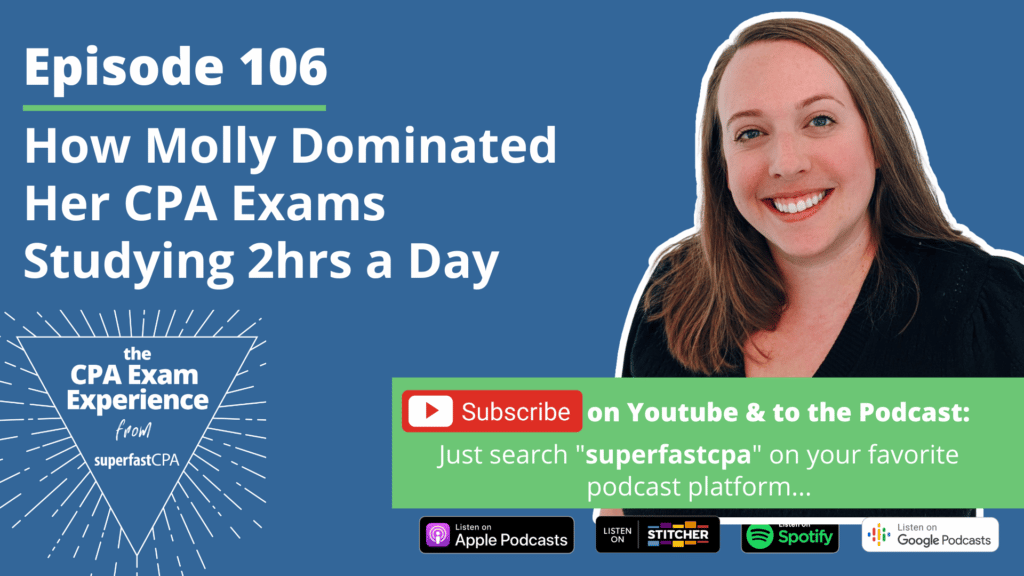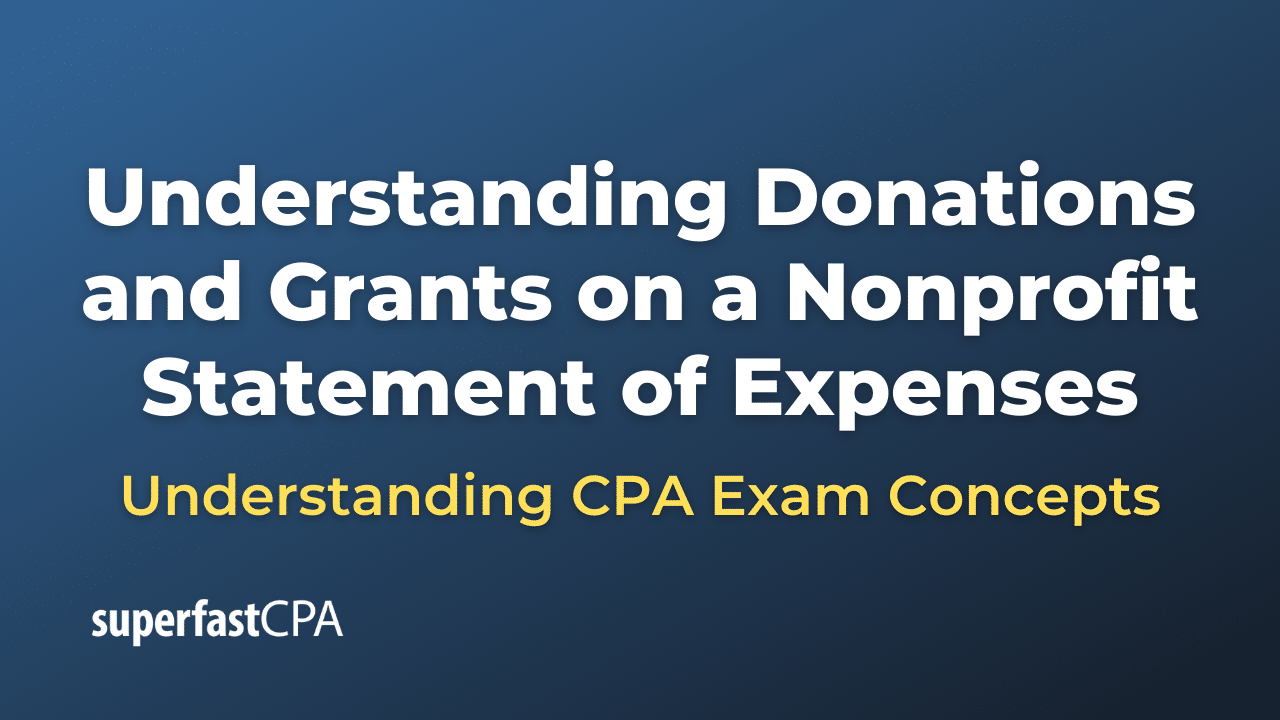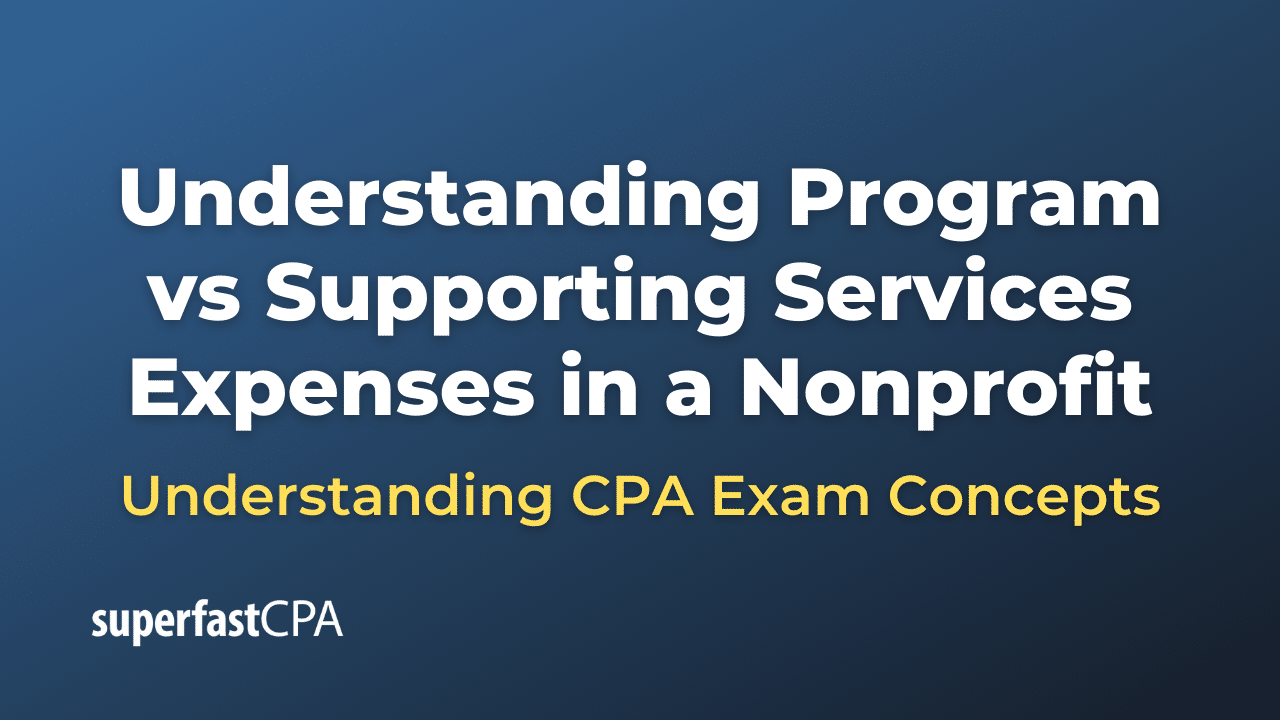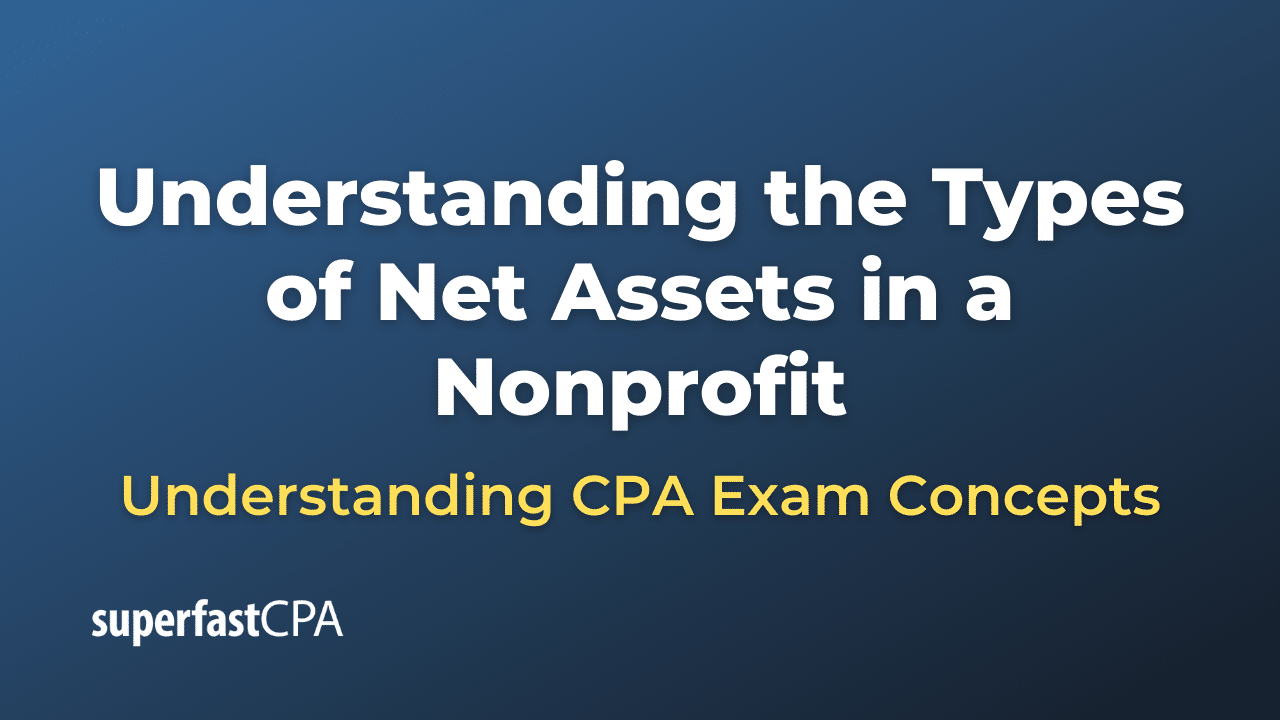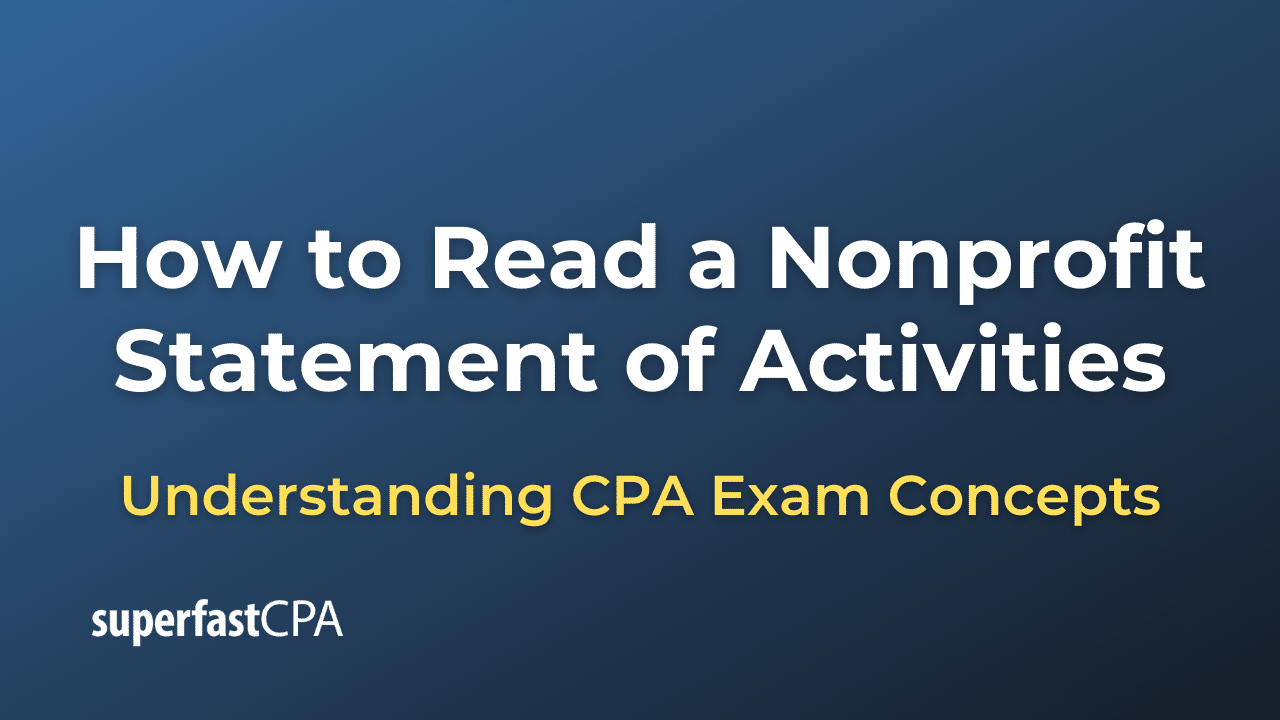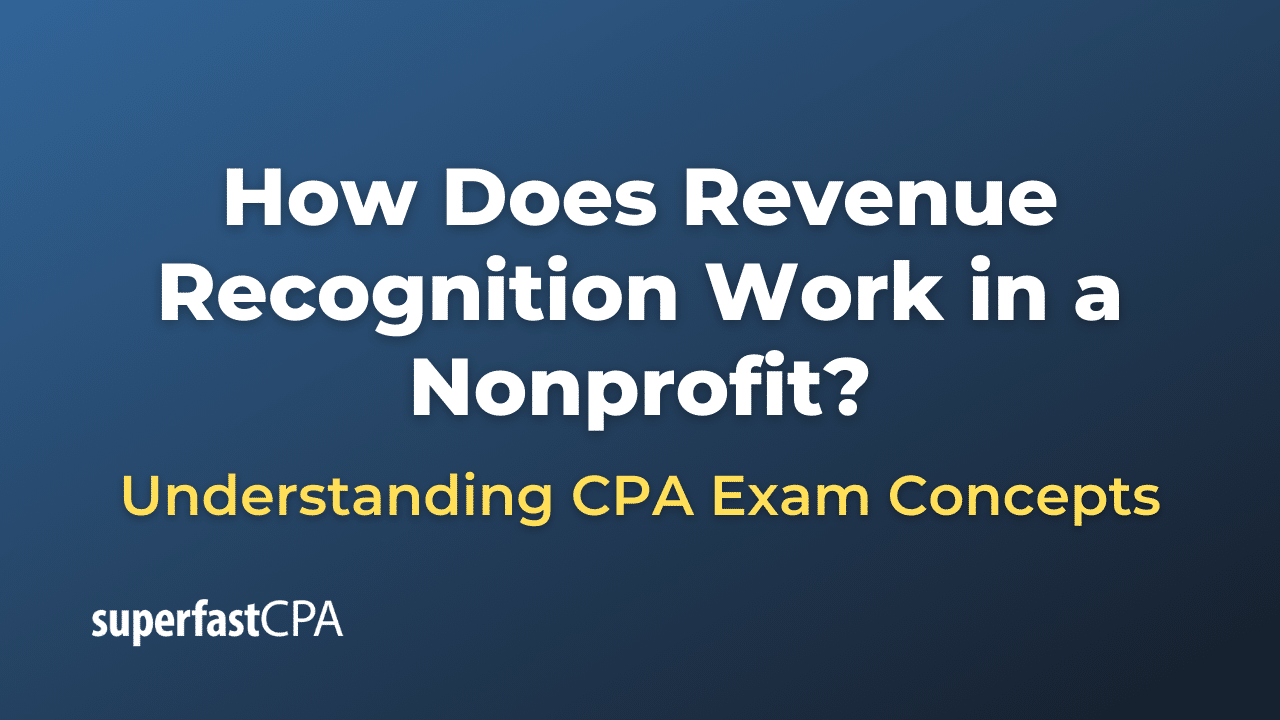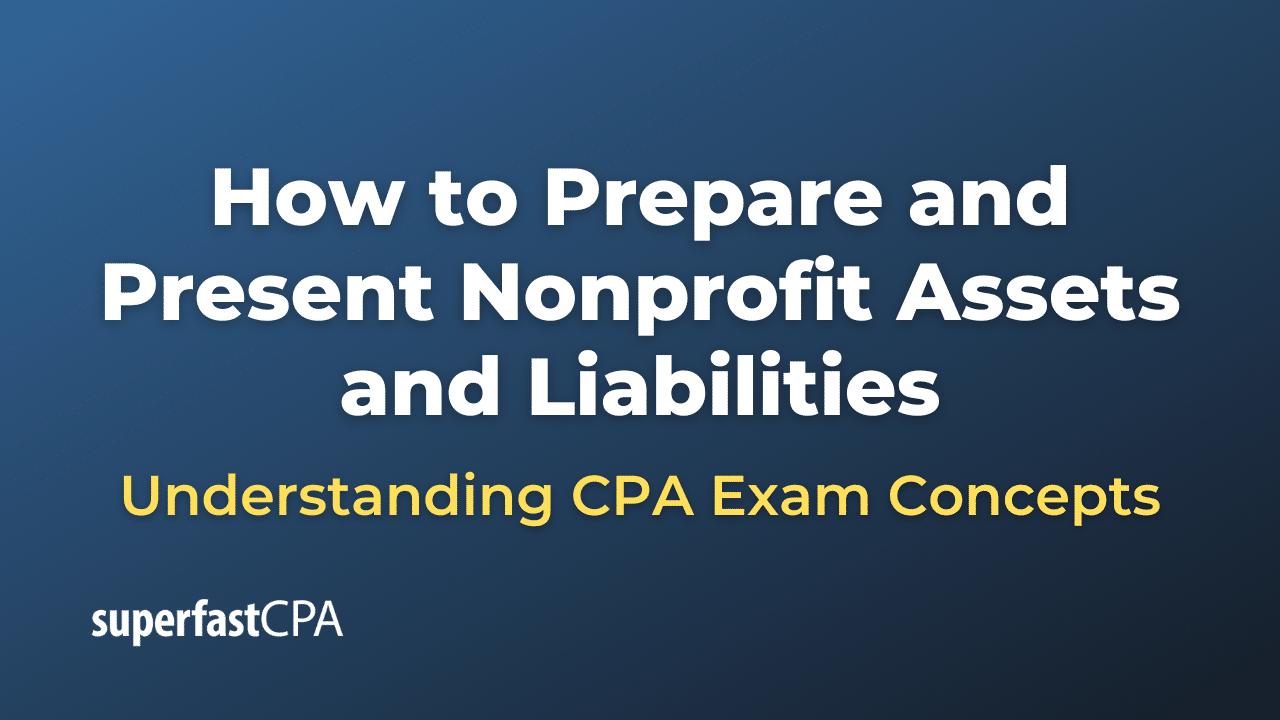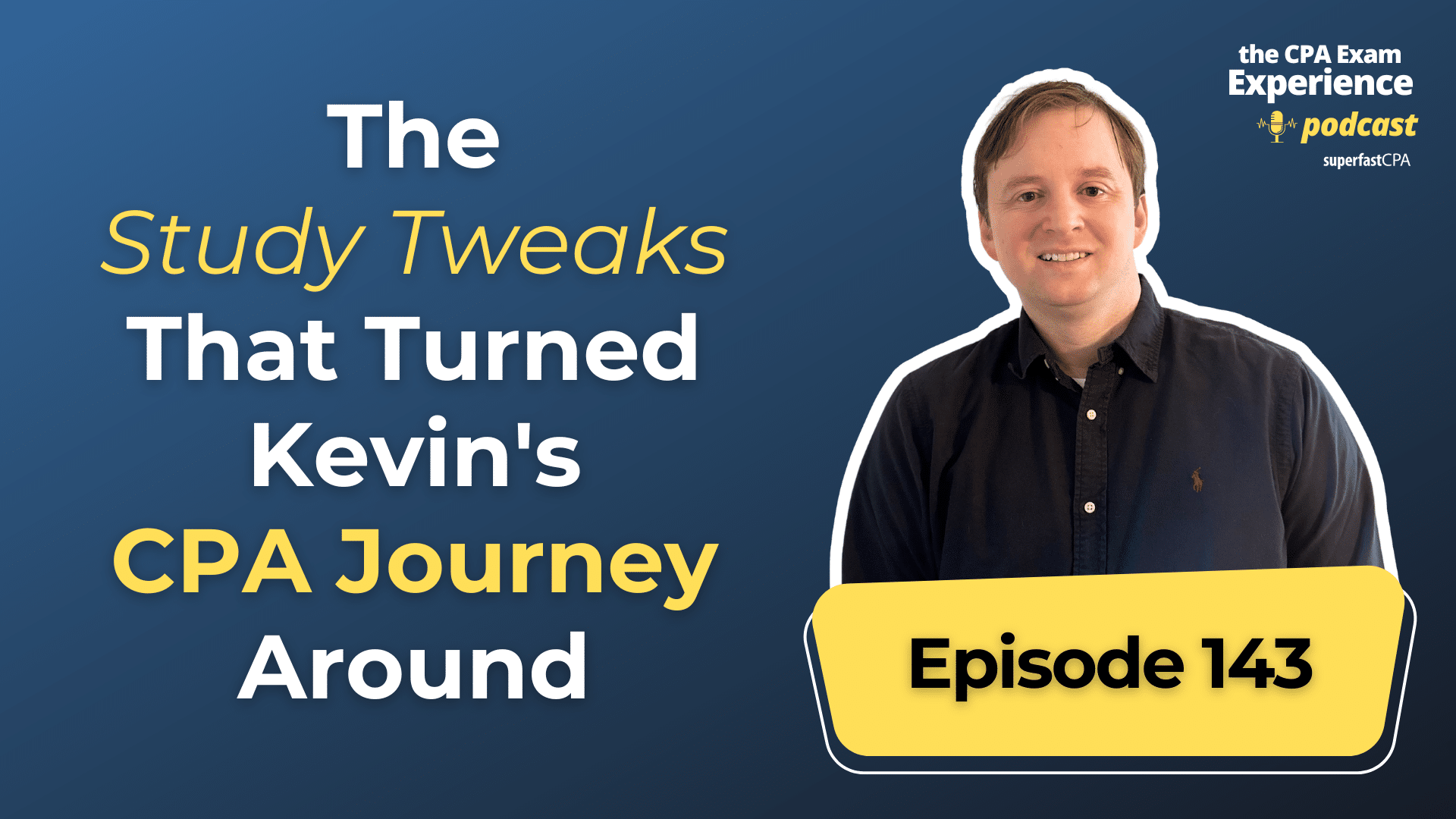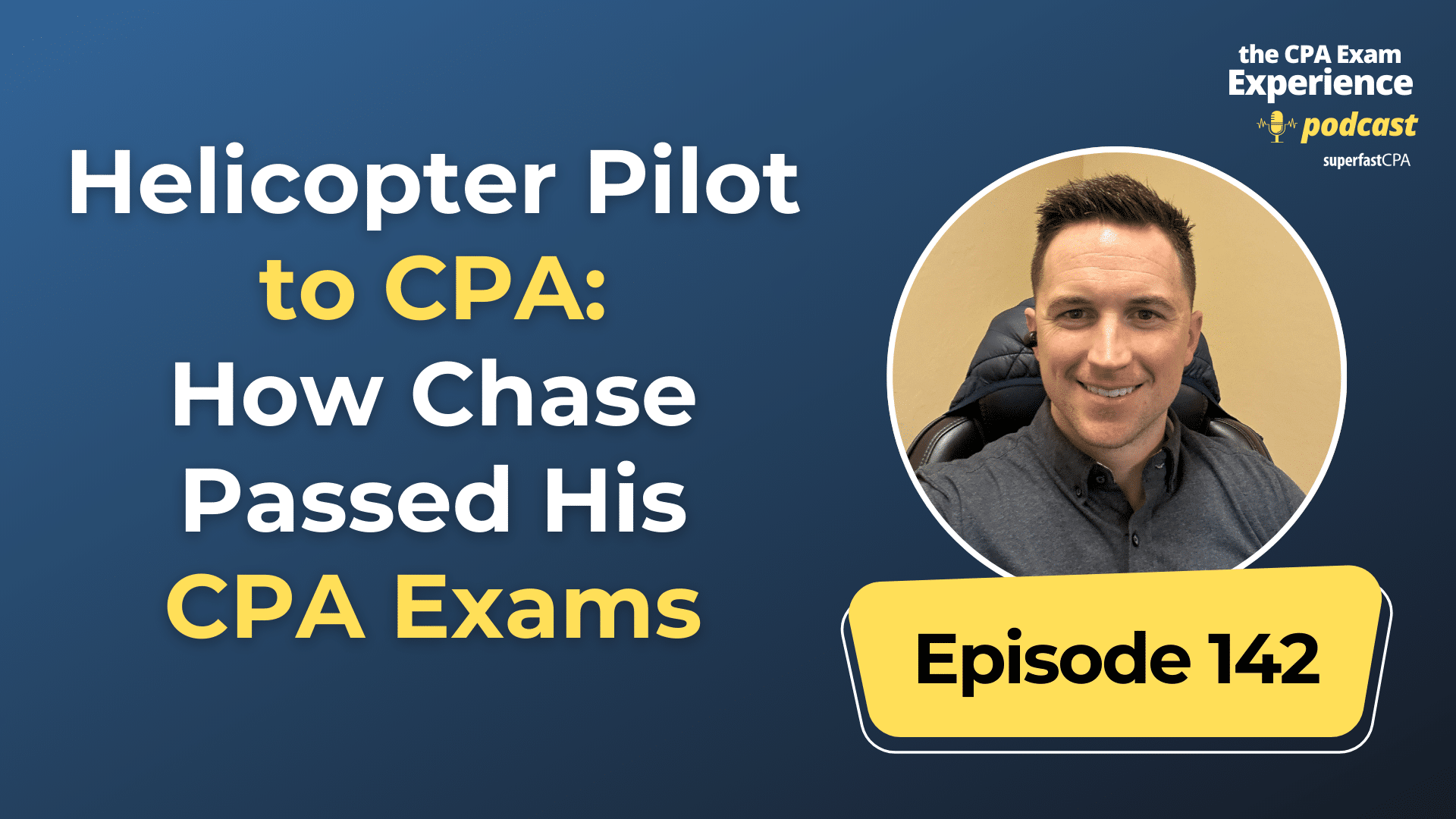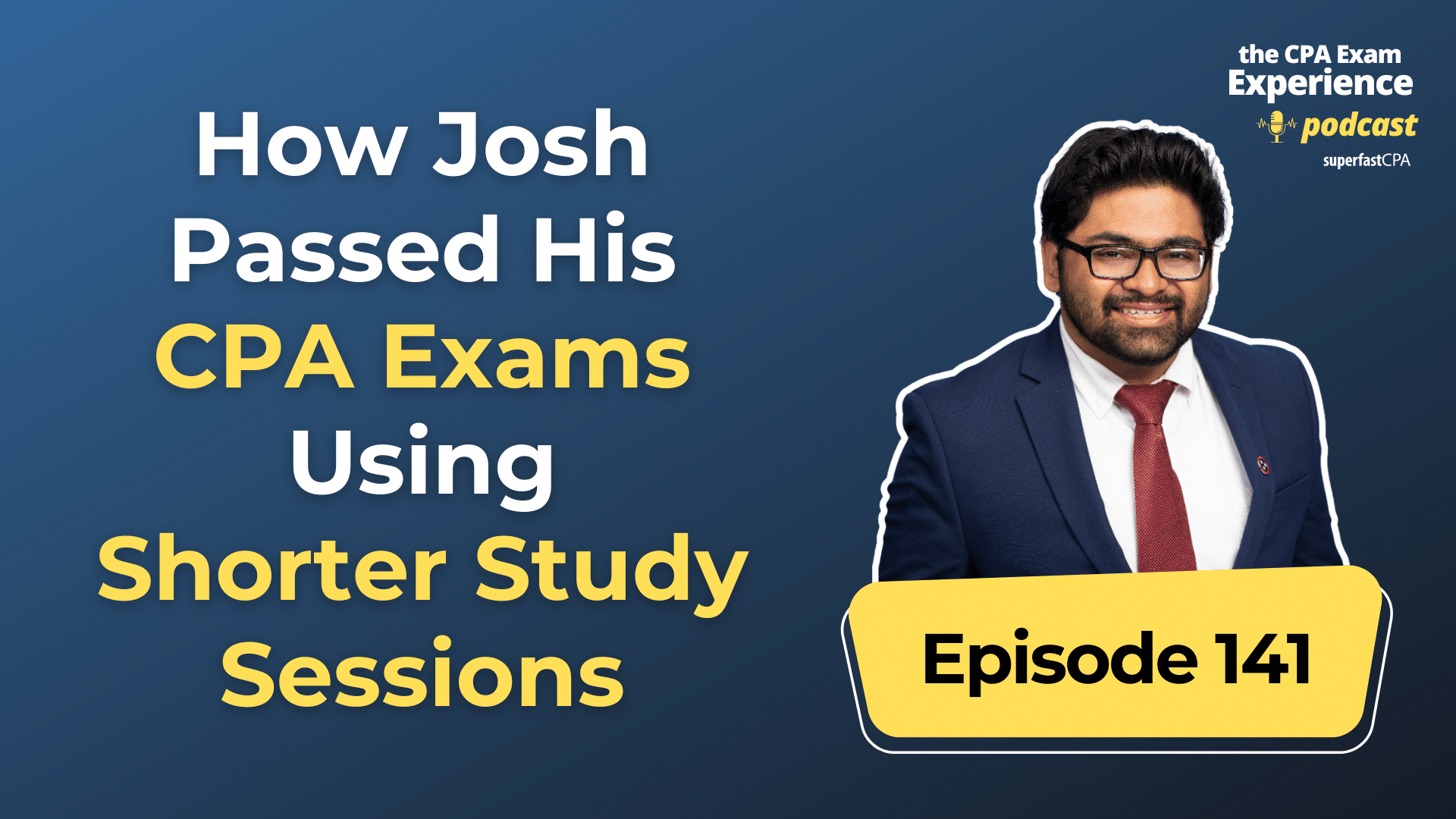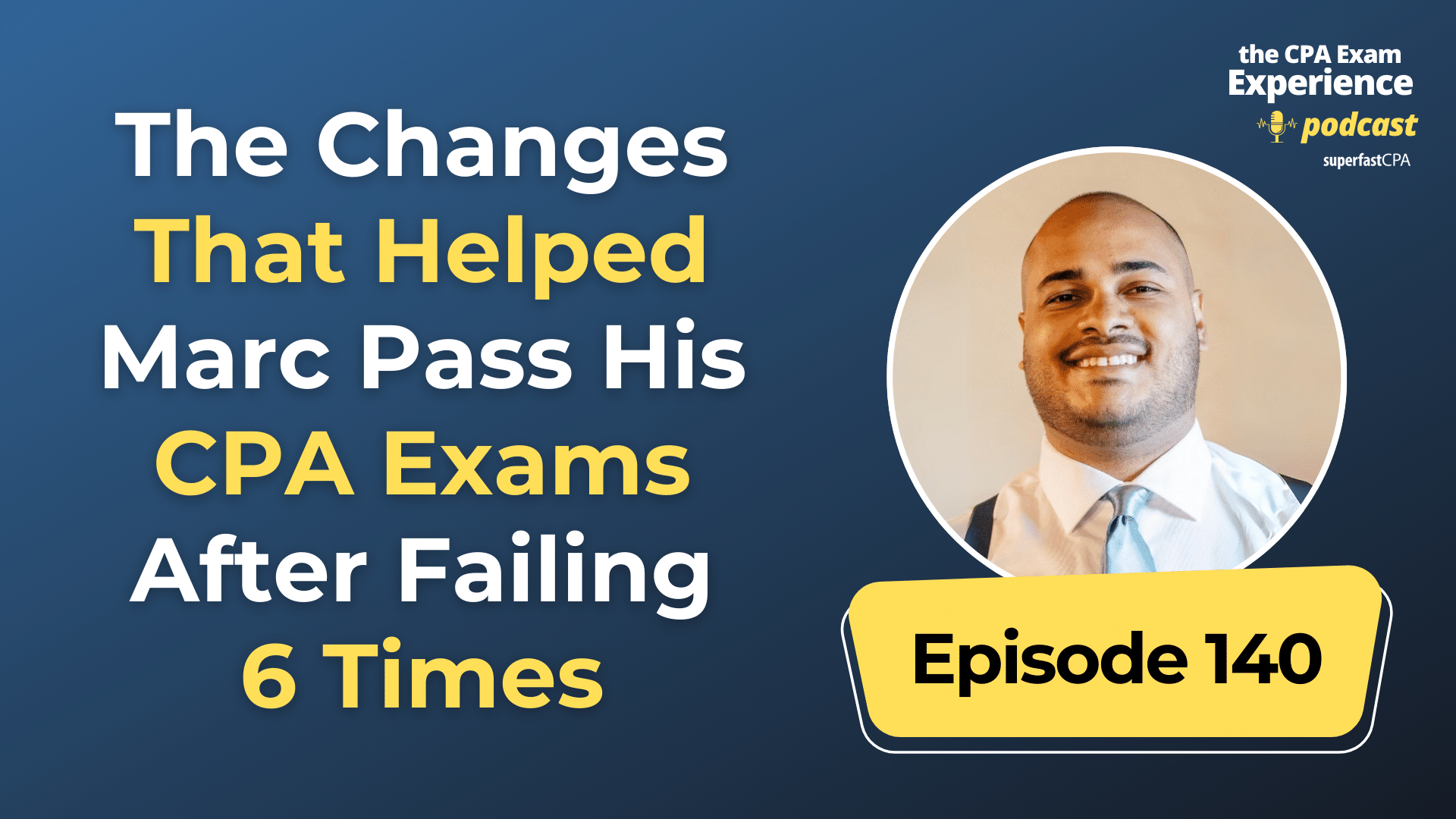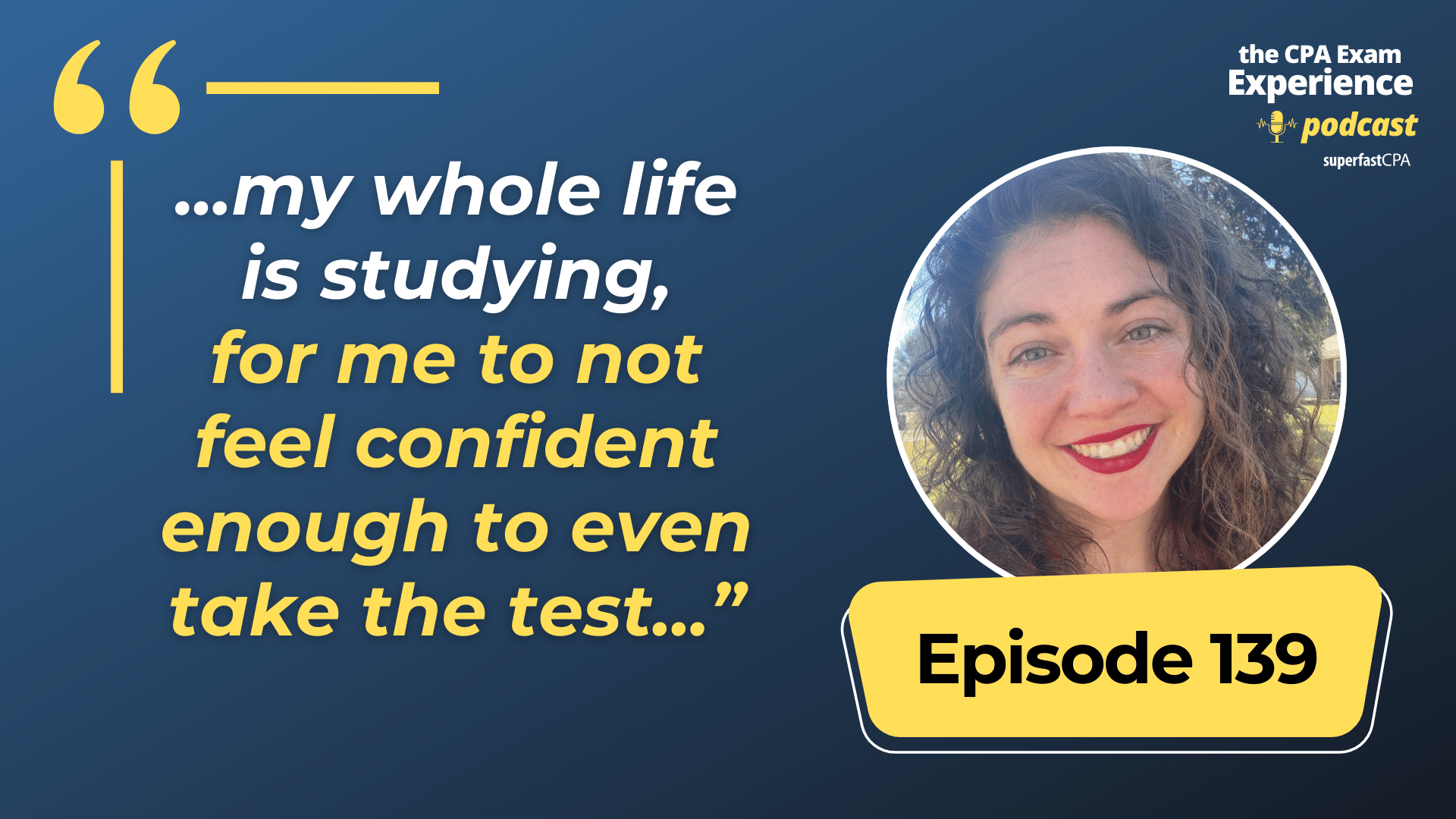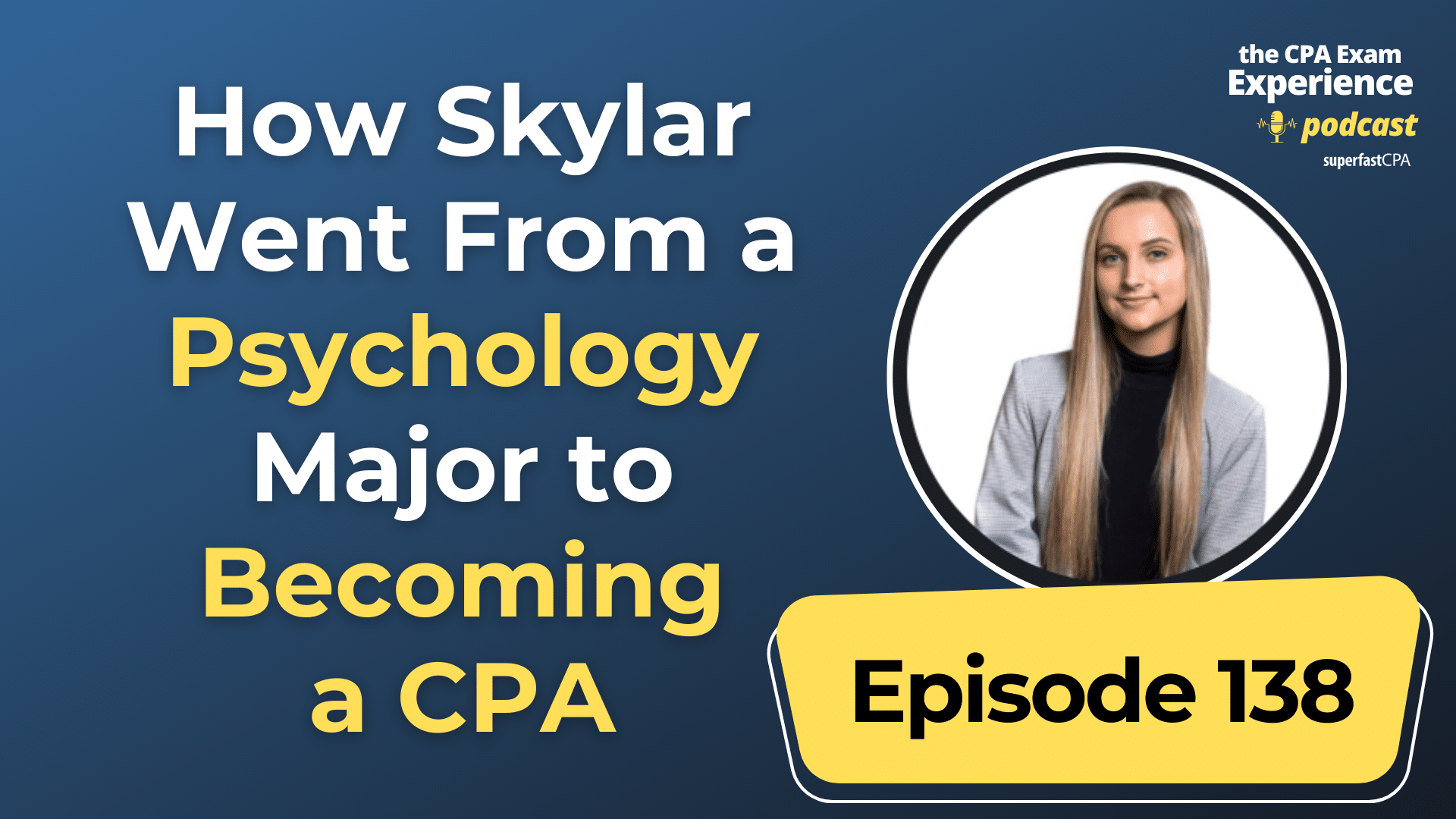In this SuperfastCPA podcast interview, you’ll hear how Molly scored in the 90s on all 4 CPA exams, while following a simple study process that only took 2hrs a day. She was of course extremely dedicated and consistent in executing the strategies every single day, but she started and finished the CPA exams in just 6 months using the strategies you’ll hear in this interview.
IMPORTANT LINKS:
Master your study process by attending one of our free study training workshops: https://www.superfastcpa.com/study-secrets/
Enter our free monthly podcast giveaway: https://www.superfastcpa.com/enter
Episode Timestamps
- 00:00 Molly Exported Interview
- 00:42 Intro
- 04:52 Molly Talks About Her CPA Journey
- 07:21 How Molly found SuperfastCPA and Started to Study
- 09:14 Putting Her Faith and Trusting the Process
- 10:46 Getting the Most Out of the Free Webinar and Podcasts
- 12:03 Created a Widget on the Phone to Help Stay on Track
- 13:23 Trusting on the New Learning Process
- 17:00 Molly Understanding of How to Approach the CPA Exams
- 18:26 Molly’s Process for Making Flashcards
- 20:35 Why Molly Didn’t Worry About the Number of Flashcards She Made
- 21:58 Molly’s Study Process for the Practice SIMs
- 24:14 Set a Goal and Stick to It
- 25:07 How Molly Studied Throughout the Day
- 28:47 Writing Down Other Goals and Rewards Helps with the Process
- 31:01 Why Molly Was Able to Free Up Time from Studying
- 33:11 Letting Go of Stress and Commit to a Proven Working Study Process
- 34:46 Passed All Four CPA Exams in Six Months
- 35:59 Molly’s Became More Confident with the MCQs Over Time
- 37:25 Getting a Score of More than 90 in All Four Exams
- 39:50 Molly’s Study Routine on the Weekend
- 41:27 Created a Visual Tracker To Stay on Track
- 44:33 Molly’s Phone Daily Reminders
- 46:49 How Molly Would Do Her Final Review
- 50:26 Key Strategies That Helped Molly
- 55:02 Top Benefits that Molly Got from SuperfastCPA
- 57:52 Outro
Interview Transcript
Molly: And honestly, I didn’t cancel a thing. We went on like a camping trip one weekend. We went to birthday parties, you know, I would like went out for my, you know, like a date night or that sort of thing. Obviously the world is a little less busy for some of us as the pandemic is, you know, petering. But, um, it still didn’t feel like I had to give, give things up because I was just very consistent with the hours of my day that I had allotted for this.
And then I didn’t feel obligated the rest of the time. It, like I said, it was extra credit if I was gonna put more time in after that.
Intro
Nate: Welcome to episode 106 of the CPA exam experience podcast from SuperfastCPA. I’m Nate and in today’s interview you’re going to hear me talk with Molly.
Now Molly really, really crushed the CPA exams. So this interview came about because she had just sent me kind of a thank you email saying I passed the CPA exams, it took me right at six months using your program so thank you. You know, that kind of a thing. So I, you know, asked her if she wanted to be on the podcast and so we set up an interview.
Once we get on the interview, towards the end of the interview, which you’ll see, I realized, or, you know, figured out that not only did she pass in six months, but she scored in the mid to high nineties on all four exams. And this was following our program to the letter, which means she was only spending two hours a day on her main study course, or, I mean her, with her main review course.
So she got really incredible results. So this is an interview you’re going to really want to listen to twice or maybe even three times because whatever she says, you know, you can use to dramatically improve your own study process. So Molly’s interview is definitely one you do not want to skip.
So before we get into the interview, two things I want to mention. First is our free study training webinars. This is the same with every other interview, this is where Molly started with SuperfastCPA. So these are one hour trainings where we walked through our core study strategies and how it’s so different from the, like the normal way of studying, where you watch every video lecture, read every chapter then go into the practice questions.
And really the why, as to why that’s so ineffective for so many people, as you know, the pass rates across the board are, just right around 50%. So those free trainings, just give you a very clear overview of what we are about and how it can change your study process.
So you can sign up for one of those free trainings at our main website at superfastcpa.com. It’s a, the main thing at the top of the homepage, or the link will be down in the description of this episode.
The second thing is our free podcasts giveaway. So each month we give away three pairs of Power Beat Pro headphones. The idea being that, especially with audio, you can be studying while you’re doing other, you know, normal, everyday things like preparing meals, walking the dog while you exercise and then obviously whenever you’re in your car, while you’re trying to get these exams passed, you should be listening to CPA audio.
So to sign up for that, the free giveaway, that link will be down in the description as well. So with that out of the way, let’s get into the interview with Molly.
yeah.
So, okay. You’ve heard a bunch of these, so let me just start with, I pulled up your email, that original email. As far as I know, yeah. I don’t think you had sent me emails during the process, really? Is that correct?
Molly: No, I didnt.
Nate: Yeah. Yeah, so that’s what happens a lot is someone, you know, buys the program, watches everything, starts, passes. And, uh, I, most of the time, I mean, I don’t hear anything or I mean, I know I don’t, it’s just those emails in passing, like stuff like that where you sent me just saying like, thanks or whatever, so.
Molly: Yeah.
Nate: I’m glad you did that and now we’re gonna hear your, your whole story, so.
Molly: Awesome.
Nate: So you did it in exactly six months. Oh, you know what?
Molly: It was wild to the day. Yeah.
Nate: Yeah. I, I used your email in, um, we started a, like a promotion and I was like, that was the point of the email originally was it’s gonna be July 1st. There’s still enough time to pass.
Molly: Right.
Nate: And you honestly sent me in that email a few days after that.
How funny.
Molly: Yeah.
Nate: Yeah.
Molly Talks About Her CPA Journey
Nate: Um, so let’s just start with the very beginning, like when you decided. Well, why did you decide to get your CPA? Um, did you originally try it right after school or what, what’s been your whole process?
Molly: No, it was a long, slow process for me, um, kind of figuring out what I wanted to do and ending up in accounting. Um, so I graduated college in 2010 with a bachelor’s in sociology. Went to work for a nonprofit, an educational nonprofit, which is exactly what I thought I was gonna be doing. And, um, we were a startup started by a fellow alum from my college, and constantly struggled with money, um, and managing it and figuring out what, how to project things and all of that.
So I ended up falling into financial management for the organization cause I could deal with spreadsheets and then moved on. Um, when I left that organization, I called our then accountant, just letting them know, here’s your new contact and got hired, uh, to work at the firm that I’m at now, which is a small firm only working for nonprofits, so we do accounting there.
So I kind of backed into it. I fell in love after that first year. Uh, so by 2016 I was working there, started taking night classes, um, remotely just through the uc system and really liked it, but I had to do it slowly. Cause I was working, I had a baby. You know, we kinda, I just did one at a time and then five years into that I had finally caught myself up since this was not what I went to school for at all.
And, uh, was ready, you know, I’d done all the educational requirements by December of 2021 and I immediately, I got my passing grade and I immediately started studying the CPA cause I was just ready to, this is like the finish line now, we were getting there.
Nate: Yeah.
Molly: Finally. Finally. Yep.
Nate: That’s cool.
Molly: Yeah.
Nate: So it sounds like you kind of, uh, I don’t know. That’s slightly different than someone who’s in their bachelor’s and just at some point is like, well, I’m in business. Some counselor tells you eventually, well, if you want something more specific than just business, you know, accounting includes all that and accounting.
Molly: Right.
Nate: And then, yeah, you actually being interested in it is, I don’t know, slightly different than the normal process I would say, so.
Molly: That makes sense.
Nate: Yeah.
How Molly found SuperfastCPA and Started to Study
Nate: How, so the CPA study process, how did that start exactly?
Molly: Um, so I was very used to self-study at that point. I’d been taking all these classes online.
I kind of knew, you know, I hadn’t forgotten how to study. I know a lot of people come back to it and they, you know, haven’t done that in a while, but kind of knew what I was looking for. So I started Googling, you know, different ways that people, you know, different programs and whatnot. I found SuperfastCPA very quickly.
You know, I didn’t wander around and do other things. I watched your webinar and I was like, yep, this is, this is the fit for me. This is exactly kind of sounds like my go-to style, I, I like the principles of how this framework sounds like. Let’s do it.
So, um, actually started with you. Bought the study materials and then again, I, you know, slammed a lot of those podcasts in the beginning and went with your recommendation to test out softwares.
So I was specifically looking for like, which software will give me that instant access to MCQs. I knew I didn’t wanna watch videos and I didn’t ever watch video. Spoiler alert, I just didn’t. Um, and I wanted one where as soon as I got something wrong, I could read a really good description of what would work.
You know, what the answer should have been to cut out any, oh, now I have to go hunt it down. So I just went with that. I tried out three or four, picked my one, and, uh, that was it. I just got started. I started on December 6th, that was my first study day and I had this little visual tracker where I’d like color in each day that I did a two hour session from your methodology.
Um, and then yeah, was off to the races. I, I did not really veer from that course. I was like, this is what we’re doing, so I dove right in.
Nate: Yeah. That’s awesome. Yeah.
Putting Her Faith and Trusting the Process
Nate: So you don’t really have a, uh, a time span where you’re kind of struggling doing it the, the normal way you just started with this right off the bat?
Molly: Yes. Um, I will say, you know, that first one. Of course for everybody. I’m sure it was kind of like, okay, let’s see how this goes. Can I pass the first exam now that I’ve done it your way? You know, I think I spent five weeks for the first one. I started with REG, which I’m not a tax person, so I was like, I just wanna try this really hard one that I feel completely not confident about and see how it goes.
Um, but it, it worked great. So, so I was like, okay, easy, test is done, now I can just repeat and just keep doing it and trust the process. Um, which worked extremely well for me and took all the concerns out. You know, I’ve done things in my life where I’m like, oh, I wanna run a 5k, like, what’s the best method?
And then I mess around and try three different things of kind of frustrating. What was nice is just you take your method, it worked for me and then I just put my faith in it and stopped wondering, you know, is there a better way? Is there something I should do? Um, which took so much time out, so much worry.
So I’m very appreciative for that, um, just to have something I could, you know, stick the course with.
Nate: Yeah. No, that’s great to hear. So, uh, so what about, I had a few questions that came in my mind when you were saying that, um, I forgot ’em all. The, uh, so when you watched, oh, I, I know what it was.
Getting the Most Out of the Free Webinar and Podcasts
Nate: So you went in and watched the PRO videos, it sounds like. So you had, you knew the full method all the way?
Molly: I did not.
Nate: Or you used them? Oh, okay.
Molly: I only, yeah, I got so much out of these podcasts. That’s why I’m like, I wanna share what I can here. Um, no, I watched your webinar, like, you know, the opening thing, I bought the materials package.
Nate: The study tools, okay.
Molly: You know, it’s the, yeah, study tools. Excuse me. Um, but not the PRO courses. I just got all these little drifts of how people had done it and what you recommended through your free stuff.
Nate: Nice. Yep. That’s, uh, yeah, I, I don’t know. In the beginning, after I recorded the first few interviews, I was kind of thinking like, I, essentially, if someone, you know, it’s pretty easy to piece the whole process together, listening to these.
And so at one point I was like, eh, that’s gonna make people think they don’t need the PRO course. And then I thought, that’s not that big of a deal. There’s some people that just hear the ideas, like sometimes it’s just the word like re-review, like one interview this, this guy was like, okay, when I just watched your free webinar and heard you say re-review, I instantly knew what that meant. And like it was like a light bulb went off.
Created a Widget on the Phone to Help Stay on Track
Molly: Right. Powerful light bulb. Agreed. Yeah. I think I wrote down, I made a widget on my phone. I took off all social media. I was like, here’s my, you know, free brain space. I made a little widget though, just a text widget of I think like six talking points I had heard you say of like kind of the key things to remember about how the process works.
And I would just see it every time I turn on my phone, I’d see like, spend 80/20% of your time, you know, do your mini sessions during the day, all this stuff. You know, it helped me stay on track when I’d sit down and be like, okay, I’m not just blindly sitting. I’m trying to do the actual method. Um, yeah, that really helped.
And yeah, it’s super valuable. I mean, everything you’ve built in the kind of sphere of the things that you offer, um, was helpful to me in different times. I just had to refer back to it and kind of build my skills. Yeah. To follow the system. .
Nate: That’s funny you mentioned the, like the little bullet points because, um, in the PRO course, like there’s a PRO forum and that’s one of the posts that I’ve pinned in there. Oh. I’m like, if you’re ever wondering about the whole process, there’s like the, the big four strategies. If you’re doing these four things as part of your daily routine, it’s hard to screw this up. So, yeah. That’s funny.
Molly: Yeah.
Trusting on the New Learning Process
Nate: Oh, so my other question was, one of the main things I hear is people really, when they hear the questions first idea and you, you can more or less forget about the video lectures. Um, it’s a big mental block for a lot of people. Like they want to score well, like if they’re gonna do questions at all, they want to like score well.
And that’s one of the things I’m always talking people out of like, okay, you, you’re just, you’re in your house, you’re not being, this isn’t scored. Well, I mean, the software tells you, you know how you’re doing, but yeah, your first time through a lesson, there’s zero consequence. It’s just the best way to learn what you’re gonna see on test day from this topic.
So did you have any struggles with that idea?
Molly: Well, totally, yeah. That, that just rings all the bells for me. Um, yes, it’s very hard, uh, you know, especially if you’re like a high achiever in college or you are used to, you know, doing well at work or all these things, it’s hard to just be a beginner again and totally own that.
And, and yeah even in the silence of your own study room, um, yes, I had to unlearn the, the desire to do it first because it takes up time. You’re sitting there, you’re staring at it, you’re like, oh, I think I remember something about this, but I can’t quite, which one is it? You know, three, four minutes go by.
That’s, that’s like a big chunk of a two hour study session. So I tamped that down. I got better at not doing that, realizing when I didn’t know the answer to something, just submitting it anyway and learning from it. And that’s why I wanted it to be, I literally wanted it to pop up and immediately tell me, you know, it kind of keeps that disappointment of, oh, I got it wrong down, you can be like, oh yeah, okay, got it. Now I’ll read this and understand.
It was some unlearning for sure. It is not easy to do. Um, and I kind of went back and forth, so I would do, you know, mostly I was doing multiple choice. Um, and then I actually realized that for me, I would start multiple choice, then start reading some of the chapters.
I’m a, you know, I read to learn a lot. That’s kind of been my style. So I did read the books that came with my study course, um, you know, my outside study course. And then just kept doing the re-review on top of that. So I eventually would read straight material and integrate it.
Um, but once I started getting through those, like I would go get it through it, read it really fast, you know, like you’re just kind of trying to get your eyes over the material. Then the multiple choice paired with writing note cards was the core essence of what I was doing. I was, um, I would kind of get through everything once, not all multiple choice, just all the reading once, and then as soon as I had done that, if I started hitting things I wasn’t getting, I’d make note cards and I wrote them all in pencil.
Because sometimes you kind of get it and you can kind of write something to yourself, but by the time you hit it the third time, you’re way better at understanding it and describing it to yourself. So I’d erase, you know, what I originally said and like write a better description or turn it into a picture or whatever it took, you know, for me to kind of click it.
Um, so those note cards got kind of ratty over time, but very powerful and, you know, you’d like weed ’em out after you started not needing them anymore. You get your little pack by the end and really good. I also wrote tons of notes on the, uh, I’d print out the review, um, what do you call them? The…
Nate: Just review notes?
Molly: Yeah, the review notes. I print those out and just, you know, write all over them and all of that. So taking it from a lot of MCQ on my phone to like in, in my hand.
Molly Understanding of How to Approach the CPA Exams
Molly: My mom used to say that there’s bashers and swoopers in the world, people, of how people tackle problems or work. So like bashers, they won’t move on until they a hundred percent understand something.
The first time, like they just keep bashing at it. and I don’t think you can do the CPA that way personally.
Nate: Right.
Molly: I think you have to be a swooper. You have to come in, you kind of get it, then you like get a little deeper the next time. Then you like listen to the audio, you pair it with some MCQs. You come back and do the like the terrible time where you’re just like, I’m gonna only do MCQs.
I’ve done before that I got wrong, and like filter that way. And you just kind of like come at it from all these different angles and it builds your content of knowledge in a way better way, but not any slower, just less frustrating, I found.
Nate: Yeah, I mean, in layers, right? Like that’s what I, that’s kind of the way that I say it to people all the time.
Molly: Exactly.
Nate: You learn this in layers. That’s the only way you can do it.
Molly: I think it’s the only way I agree. Yep.
Nate: Yeah. Yeah. Going back to that, I mean it, when you talk it out, you know, the normal process. You’re more or less trying to master a lesson upfront, but then you.
Molly: Yeah, that’s what a software wants from you.
Nate: Yeah. And that just, that makes no sense. This, the exams are just way too big. Um, yeah, just cover way too, too much material. Yeah,
Molly: Definitely. Definitely. Yeah. Agreed. I found that to be the case.
Nate: Yeah.
Molly’s Process for Making Flashcasrds
Nate: So on your flashcards, how many, or I guess first, you said you would kind of save that for like the daily re-review for when you’d miss something several times or what, what was your, when did you primarily make the flashcards?
Molly: Yeah, I didn’t wanna make flashcards the very first time I hit something I didn’t know cause there was a lot of things I didn’t know. Like that REG exam I knew I didn’t know a lot. Um, and it just felt like, of course I don’t know it, I’m not gonna write it down the very first time I’ve seen it. I wanna write down the things that are hard to remember, hard to get.
So I went through all the reading and overlapped that with the re-reviews and then, you know, additional MCQs for each chapter that I hit. And then once I had done that all once, then I’d go back and say, okay, now anything from here on out, anything I’m not hitting that I don’t understand, I still don’t get, or I’m still getting wrong on the MCQs. Now I’ll write the note cards.
And then those note cards I, you know, I would come back to, I’d say, oh shoot, I remember I wrote that note card about that thing. But now I totally get it. So I’d go find the note card, like, you know, correct how I had written it the first time to something way easier to understand.
Or, um, if there was just a really good example, I needed no words, I just needed the formula or something, I’d go back and just erase the whole thing and say, this is the how I know I’m gonna need to, because that’s how every MCQ is structured. You know, that kind of, again, layered learning about what is it they’re gonna ask.
Nate: Yeah.
Molly: What do I know? What am I most comfortable with? Yeah. Kind of build it.
Nate: Okay.
Molly: Yeah.
Nate: Yeah. And that’s a huge argument for, um, the way you put that. Just the, I mean, the whole re-review thing. Again, when you explain that out, it just, it makes so much sense that it just sounds so obvious. But again, that’s not how most people approach this.
But then seeing questions. Multiple times, like later down the road and you’ve built all this understanding in other areas and it just for that for some reason makes sense on like a new level where that would not happen if, again, back to the traditional approach, you’ve only covered this one time and then you try to do a final review.
Molly: Yeah, definitely. Agreed.
Why Molly Didn’t Worry About the Number of Flashcards She Made
Nate: So about how many flashcards would you end up with per exam.
Molly: Um, well, I try to well it down, you know, I wanna be able to bring a little pack with me and sit in the car before the test and like, finish my coffee and look over them. So I didn’t want more than, you know, 20, 25 in my hand. Um, but I had lots, I just, I just recently pulled them all out, made a little pile.
I’m like, I’m gonna have a bonfire in my backyard to celebrate not needing these ever again. Um, yeah, so there was a lot over time. I think there’s something that old study where it says if you write it down, it really gives you that connection. You’ve talked about that. That’s so true. Yeah. I mean, I felt like that’s true for any kind of learner at any age.
So I didn’t mind writing them a lot and then just kind of ditching them when I didn’t need that topic anymore. I was already feeling confident in it.
Nate: Yeah, and that’s, um, you know, I would, I did mine on BrainScape back, or at the time, and you could just score those, like, uh, there was a color system. So in the app, if you mark something green, it’s like, I’ve answered this right?
I know this one. You can show this less. You know, just that general idea. Yeah. And then I would have my sets of red and yellows for like the last three days before an exam. Just the same idea. You can kind of whittle it down.
Molly: Yeah, for sure.
Molly’s Study Process for the Practice SIMs
Nate: What about practice Sims? When did you use those in your study process?
Molly: Yeah. Um, well for the first exam, cause I’d never done it before, I was pretty heavy on them. You know, I tried to actually work through them. Um, again, reminding myself, it’s okay if you don’t know it. Just either plug something in or leave it blank and like, move on. You know, you gotta move on. That got easier with time. It really will.
If you’re new to this, it feels super uncomfortable, but it does get easier. Um, but by the fourth exam, I mean, I was so ready to be done. I chose BEC for my last one. I got Covid during my studying. I’d only left myself four weeks for the, in the first place for how long I wanted to give it.
Um, and I knew that I just needed to know what kinds of sims they were even gonna show me. So I set my course to give me all of them in one quiz. Like I was gonna take 15 sims, you know, in one practice quiz, just so I could flip through them. That’s all I did on my last one. By that time, you know, I kind, so I worked my way down.
I would, I would like heavier in the beginning. What is a sim about? How does it work? What kind of things are they asking? And then over the course of those four tests, by the end, I just needed to. What am I in for? You know, what broad strokes things are they gonna be asking? Um, and then really relied on the MCQ to teach me the full content of whatever I was gonna be faced in those.
Yeah.
Nate: Yeah. That’s just another perfect description really of, yeah, how it’s supposed to work. Again, most people, it’s just kind of how, it’s kind of the assumption that’s built into review courses where people feel like I need to be able to generate, like start a sim and fill it out and then see how I did. Where it’s much faster to, if you’re stuck in the first 10 seconds, just submit it. And reverse engineer it, and then cover up the solution after you’ve seen how it’s explained and see if you can do it after the.
Molly: Yeah, that’s good.
Nate: And instead of spending 20 minutes on the front end, you know, thinking you’re filling it out and then finding out you did it wrong, you know, you times that across six weeks or whatever. It’s just so much time.
Set a Goal and Stick to It
Molly: Yeah, yeah. I knew once I got through that first exam, I set the goal of doing it in six months. I didn’t know how it was gonna go. I kind of used that first one as like, well, we’re just gonna see how it goes. I just wanted to be done. You know, this was year, years in the making.
I really wanted that CPA designation to finally kind of get to the end of a road and move on with my life, you know, with some other goals. Um, and having that framework helped too, cuz it then you, you couldn’t waste time. Right? It was completely in my head. Nobody needs to do it in six months necessarily, but, um, from the get go.
Um, it just meant, I was like, I can’t, I’m not gonna waste time doing things. I have to let go of that desire to get it right or the ego behind getting it, you know, getting the little softwares, oh, you completed another quiz, you know, just gotta, right.
Nate: Yeah.
How Molly Studied Throughout the Day
Nate: Um, and so what did a day of studying look like? Would you just do the two hours in the morning and, or you just, yeah.
Molly: Yeah. Um, so about six days a week. Um, I would usually take one weekend day, make my husband, you know, take my kiddo and let me sleep in. But, um, I would get up at five, which is not my usual time, that’s later than usual. Um, but I’d set the alarm come do a two hour session in our guest room here and, um, just kind of got used to that, you know, the brittle, the brittle, uh, reality of trying to find extra time in your day when you’re already a busy person. Um, but I, I trusted the, the fact that it did make more sense to do it first thing in the morning.
I did not wanna do it at the end of the day. Sometimes, you know, you’re, you’re traveling or whatnot, you have to do it later. Um, but man, those two hours. Essential, like, you know, that was a lot of new learning and big chunks of, I would do meaty stuff there, but the mini, the mini sessions, um, yeah, were constant.
I had my phone all the time, you know, I’d be at my son’s swimming class doing one. I’d be, you know, waiting at the grocery store in line. I’d do a few, that sort of thing. I tried to set myself up so that I could switch between using your quizzes, which are already these quick five, um, question thing. And then in the app, for my other study course, I would pre-set up a quiz in the morning.
So at the end of my session, I’d do my 30 MCQs say, okay, great, like I did that chunk. Now I’m gonna set up another 15, qu, 15 question quiz, so I don’t have to set it up, go through like which filter do I want, etcetera. I just wanted it ready, ready, ready.
Nate: Yeah.
Molly: So I would always kind of set myself up to remove any barrier possible that would make it harder later.
I would read those notes usually at night, like you suggested. Sometimes I just needed] to like not be on my phone for a while, so I’d use the printouts as a break from that. And then I listen to audio. I mean, even like in the shower, you know, I’d turn it on really loud and listen in the shower in the morning or on my way to and from preschool, just fill in all the other times.
I love the audio because it felt easy, but it was actually. That’s when a lot of light bulbs went off when you, you like understood something your own way by kind of reading it or doing a practice question. But then you come back and you hear your voice, you know, explain it, and it’s just a, from a slightly different angle, you say, okay, I got it.
So I use that all the time. I, you know, I listen to each one probably like six times through, uh, in the course of the study weeks that I was doing that particular section. So did all the above.
Nate: Yeah. And it is, it’s, it’s huge. Just the, I mean, I don’t know the, I can’t describe it like a neuroscientist would, but it’s something about kind of like what you said, getting the info in different formats and even different, uh, even different settings throughout the day.
There’s a bunch of research on that, like the whole retrieval learning thing.
Molly: That makes sense to me. Yeah.
Nate: Yeah.
Molly: Yeah.
Nate: Then the time thing, it just makes sense to, okay, these exams are a complete nightmare for some people and you should be doing, if you’re gonna pay the money, you bought a review course, you’re spending time anyways.
Fill up like every possible second and being able to do that on your phone, it just makes sense and it helps you add in two, three hours a day extra, which is like a hundred plus extra hours that you wouldn’t have otherwise.
Molly: So helpful. Yeah.
Nate: Yeah. Like it, it’ll just pay off.
Writing Down Other Goals and Rewards Helps with the Process
Molly: You made, you said that neuroscience thing I read years ago that if you have trouble with, uh, It’s this delayed satisfaction thing.
So if you put something in your Amazon cart but you don’t buy it, you just leave it there, you get the same like dopamine hit basically as actually purchasing that item. So you just leave it there overnight and you can decide in the morning. So what I would do is I had a like a list on my phone of all the things I wanted to do with spare time that I didn’t have time for, and I would just add to that list.
I’d be like, I’m gonna, you know, learn spanish again. I’m gonna watch this movie. I’m gonna, I’m gonna write this novel down that I wanna read. And it actually helped, it was motivating and I could go back and see like, oh, I’m so excited to do all those things. And also it sort of took the pressure off of like constant disappointment that you didn’t have time for those thing.
And you could say, no, what I’m doing right now is studying. Those things will wait, like I will do all of those things. I have not forgotten about any of them cause they’re on my list. So, um, yeah, it helped a lot with the, you know, that daily instant gratification versus long-term gratification battle that inevitably ensues with a long-term project like this. So, yeah.
Nate: Yeah, that’s the first time I’ve heard that specific thing, but that’s, that’s a good idea. Um, Would you just do that in like a me, uh, like the notes app on your phone or something?
Molly: I actually kept it in my calendar, so for six months I had this calendar item every day that said after exams, that was the title of it.
And then I would just add to it. It’s a pretty long list now, and now I finally get to go, you know, do some of them since I just finished in June. But, um, It, it’s like, um, you know, a little less tangible version of your reward system, which I also tried to bake and I was like, oh, I’m gonna do these things and broke it into, you know, sections for each one.
But this one felt like I could immediately do it, you know, I was like, out of my head, don’t have to feel, you know, mad and upset that I can’t do that with my time. So yeah, it just was, it’s always on my calendar , um, throughout that whole six months.
Nate: That’s funny. Um, man, I had my next question ready? Uh oh.
Why Molly Was Able to Free Up Time from Studying
Nate: So the evenings, so you studied in the morning, you did the standard two hour thing in the morning and then mini sessions throughout the day. And so were you able to kind of enjoy the evenings to a certain degree or not have to worry about studying a ton?
Molly: Yeah, I would usually pull up my phone to maybe do a quiz or something in the evening. My son would go down to bed at like 8:00 PM you know, so the rest of the night was kind of my own, which it really did make it for feel more balanced. I could spend time with my husband, like, you know, watch our show or whatever.
Um, if you know, he was doing something, like I said, I might do another quiz or look at the notes but the idea in my head was that it was not required. You know, that was kind of extra credit to put that time in, so, um, it didn’t feel arduous to do it that way. Yeah, no, we basically did that. Yeah.
And honestly, I didn’t cancel a thing. We went on like a camping trip one weekend. We went to birthday parties. You know, I would like went out for my, you know, like a date night or that sort of thing. Obviously the world is a little less busy for some of us as the pandemic is, you know, petering. But, um, it still didn’t feel like I had to give, give things up because I was just very consistent with the hours of my day that I had allotted for this.
And then I didn’t feel obligated the rest of the time. It, like I said, it was extra credit if I was gonna put more time in after that.
Nate: Yep. That is the nice thing about, it’s, uh, I talk a lot about how yeah, you can pass the exams and still have a life type thing. It does require to be, that you’re highly disciplined.
Molly: Yeah.
Nate: Um, but then by the evenings, you know, you’ve put in, I mean, the two hours, depending on the mini sessions, maybe four to five total hours. You can just, yeah, take a complete mental break and if you’ve nailed the studying, that’s almost just as important as the studying itself, just to have that.
Molly: Definitely.
Nate: Not feel like your entire life is work, study, stress out about studying.
Letting Go of Stress and Commit to a Proven Working Study Process
Molly: Yeah, honestly, the stress. Taking out the stress by committing to a system that, you know, once that first exam was done, like I said, it was a proven system for me. It took the stress out of wondering. Even like that last exam, like I said, I only had four weeks. One of those was gone to Covid.
I had this very interesting moment where I said, I’m just gonna presume that I am doing the same things I’ve been doing and that it’s gonna be fine. I didn’t think about extending it. I was like, no, I’m just keeping my original date and trusting that it’s gonna be fine. Um, even though. You know, I’m like part of these Facebook groups of other people, especially moms studying for CPAs, and half the battle is just getting through your own stress over it and worry about whether you’re, you’ve done enough, should I do it sooner or later?
And all that. I a hundred percent understand that. And I just didn’t want it. I didn’t want that for myself. So it was nice to let it go and, and, do enough of the work in the right, in the same sequence of events. Right for four different exams that, um, you don’t have to carry that additional burden of stress.
Nate: Yeah, no, there is, that’s a huge factor. There’s, I don’t, it’s like the study process itself or just, uh, kind of this general anxiety about the whole thing. And yeah, when you know, you’re, when you know you have your process down to a science, that that’s all goes away. It’s really just as long as you put in the time each day.
Molly: Yep.
Nate: It’s just relatively simple after you get to that point.
Molly: Yes. Agreed.
Passed All Four CPA Exams in Six Months
Nate: So you passed the last section with like three weeks of studying basically, was that BEC?
Molly: Yeah. Basically three weeks of studying. Um, yeah, I took the exam on June 6th, so that was exactly six months after that first day that I marked on my little tracker and, um, I passed. So it was, it was done, it was a done deal. Um, and it felt so good. I mean, it was such a relief. And, you know, I’m somebody who likes to make goals. I think a lot of us who are, you know, setting for this CPA set that goal for ourselves. You know, you can choose other paths, but we’re that kind of people.
So it was nice to be like, okay, fresh path, new time. We can like, you know, go on to the next thing. So it felt really good and ha, I was so happy to be done, so. Great.
Nate: Yeah, just the, uh, yeah, just the biggest relief in the world. It’s not like.
Molly: It is.
Nate: Maybe not my happiest moment, you know, but like as far as just a relief by far. Just such a relief. So nice.
Molly: Absolutely. Yes. Yeah.
Nate: Um, so one question I have about going back to your very first exam and you’re kind of thinking, I’ll just try this out. See if this works.
Molly’s Became More Confident with the MCQs Over Time
Nate: So towards the end of your study time or your study timeline closer to the exam, do you remember what you were scoring on sets of 30? Just.
Molly: Yeah, definitely. I actually went back and kind of checked that for myself a few times of like, how does this work, you know, over the different exams. Um, so that first exam, like I said, was my, basically I was learning a lot of new content that I hadn’t heard since early accounting classes. You know the few ones about tax that you have to do.
And I was scoring probably in the eighties consistently, and then I got to a point where right before the exam I told myself, I feel like I don’t need to keep doing these over and over like that last week I was like, I feel pretty confident that I like have got enough of this. And in that range I was hitting like, you know, 80, 85, every time I would take a quiz. I wasn’t having bad quizzes anymore, but that was really the only exam where that happened. Every other one, maybe my confidence just gave it a boost. I didn’t feel like I had to get, you know, every single one to a, you know, an A Grade. I was getting 75 average.
So I, yeah, I wouldn’t really worry about it if I was getting less, you know, more than 75. That was good enough to pass, I mean, and pass higher than that.
Getting a Score of More than 90 in All Four Exams
Molly: Um, I was passing, uh, in the nineties with my scores, so it wasn’t, um, I didn’t have to have those nineties in the practice to get to that point.
Nate: That’s, that’s, that’s, those are high scores.
Nineties, that’s high. Yeah. Yeah. And you’re not doing the, I mean, I swear like people winning the Elijah Watt award or whatever it’s called.
Molly: Oh!
Nate: Where they score like 96’s.
Molly: That’s like, I think you have to have 95, it’s their average. I don’t have that. I was, I think my highest was a 96 on FAR and my lowest was a 93 on two of the other ones.
Um, which is so funny to me because.
Nate: That’s crazy. And now that’s a high score.
Molly: Yeah, it was, it was way higher than I was expecting because I’m not like, you know, this is not what I went to my, this is not where I started, you know, my education. I’m more of a writer and, you know, all of that sort of thing. So it was very interesting testing myself in this different way.
Um, but I think it’s more about study skills than intellect, you know? It’s not about that. It’s just.
Nate: Yeah.
Molly: I think anybody can do well enough, certainly well enough to pass, get that 75. And I surprised myself at that range. So it wasn’t like, oh yeah, I’m just that kind of person I expected to get in the nineties.
So it was a happy surprise, but not something that I planned for or thought, oh, I’m definitely, you know that and that’s what I’m aiming for, so.
Nate: Still, I would put, I would bet money, I mean, where you essentially spent two hours a day with your review course and that’s it. To score that high. I bet, I bet you’d be shocked, like most, if you took most scores of like 95 or 96, I, I would bet money that pretty much every person was studying like six to eight hours a day to get that score. Like that’s just.
Molly: Just gets me like a heart attack, thinking about that. Thank goodness that is not what I wanted in any way. So I’m glad I didn’t take that route.
Nate: Wow.
Molly: Giving over.
Nate: And it’s funny, uh.
Molly: Still working. still had my son, you know.
Nate: Yeah.
Molly: Not, did not want or need to spend that much time.
Nate: Yeah. No, that’s, that’s awesome. Um, oh, the weekends was one of my last questions.
Molly’s Study Routine on the Weekend
Nate: Did you study a little longer on the weekends or what was, what’d you try to do for the, on the weekends?
Molly: Yeah. Um, you know, if you have a partner or like a significant other that you’re with or even a roommate, they’re kind of in this with you. Um, so our agreement was Sundays I could take as long as I needed in the morning. So I would, I would, that was my day to kind of sleep in a little bit, but I would still, um, do the full extended amount of time.
So I wake up eight and try to be done by 11, you know, do a three hour session would be the longest. And then definitely on the weekends I was doing, you know, I’m like on my phone more cause I’m not doing my day job. And um, I would do way more quizzes during the day, that sort of thing. Um, my son’s four and he got really tired of me saying, I’m sorry, I have to finish this quiz, you know, he was like, done with that. I don’t wanna hear about quizzes.
Nate: Yeah.
Molly: Um, but yeah, I, but, so that was my biggest session during the week. Sundays were like this magical time where I could just be locked away outside of my, you know, real world responsibilities for a while and just focus on what I needed to do. Um, but, you know, life intervenes and I should say I tried to do two hours every day, but sometimes, you know, it was, I still had to get up with my son. So if he was up at five 30 that day, sorry. You know, I didn’t get it in. Yeah. And I had to make it up later. So it’s not that I had every freedom in the world. I think that’s not realistic.
None of us, even without kids have that. And so, um, that still happens. That still very much happened to me and you know, we would travel, we would do whatever, and things got out of routines. So it doesn’t have to be a perfect thing.
Created a Visual Tracker To Stay on Track
Molly: That’s why I started this visual tracker, is that even if one day you don’t get it, you shouldn’t feel discouraged or like, oh, now my routine is shot. I’m not gonna pass. I should delay this whole thing. It’s the overall momentum of over time, all these hours, all these days. Like you kind of see it visually and you’re like, yes, look over this, whatever, five week period. I got a lot of studying and, and you can visually see it. That helped me anyway. I’m a visual, visual motivation.
Yeah. Um, and I think that’s just something to like, to remember when we have these busy lives with things that come up unexpectedly all the time.
Nate: Right.
Molly: Yeah.
Nate: Uh, can you just go into your visual tracker? Is that just on a piece of paper or what were you actually doing?
Molly: Yeah, I got it through a blogger. It’s basically a circle for every day of the year. So imagine it that way, like one little circle to fill in. And I told myself I would fill it in with a full circle if I got a good two hour session in. Don’t count anything for the minis. Like I said, that was just an a daily thing I was doing no matter what. But if I got that two hour session in, I’d fill in the whole circle.
If for some reason it got delayed or you know, it wasn’t really that session, I’d just fill in a half circle. So like, yes, you still get some credit for it, and you look over that. Over six months, it was for me, but you could do it for however long it took you. It’s really powerful. It shows you so much of like what you’ve invested in this.
And again, the overall pattern was that I was studying a lot. Even if one day was blank, you know, it was, you just went on. Yeah, go to the next one.
Nate: Yeah. Okay. So just a super simple one circle a day and you based, filled it in according to a kind of an arbitrary percentage.
Molly: Yeah, exactly. Yeah. Whatever I assessed it to be. That’s how I did it.
Nate: Yeah. I like that idea. I might even have to like make a printout because I do have that one free printout thing that’s, uh, put in your, the good things that will happen and the bad things.
Molly: Yeah. Mm-hmm. Definitely.
Nate: But that’s, that’s a good idea.
Molly: It is a good idea. You should do that. I think that would fit really well.
Nate: And I can say the person that gave me this idea scored in the nineties on her exams.
Molly: Right. Yeah.
Nate: Go try it. Yep. Um, yeah, that’s, I don’t know that that’s possibly, I talked to a few people who’ve scored in the nineties, but I mean, typically, cuz like my scores were 70, I mean, I think I got an 80 something on my FAR, my one retake.
But other than that I was like barely below eighties. Um, and yeah, I’ve never tried to say like this is, this’ll help you win the Elijah Sells Award. Like this is strictly, get these done as fast as possible.
Molly: Get you done as fast as possible. Yeah, exactly.
Nate: Yeah.
Molly: Yeah. Um, which I, put a hundred percent, you know, jived with was, was on board with and, uh, succeeded with. So I, I’m just very thankful for that .
Nate: Yeah. Um, yeah.
Molly’s Phone Daily Reminders
Nate: So can, do you mind telling me what exactly were your bullet points on the little thing on your phone? For the whole day? Yeah. Or that you kept on there?
Molly: Do I still have it up? I might have taken it. Nope, I still got it. Okay. So there’s six things. So a doable daily study routine.
So two hour main session plus minis. That’s the first line. Two. Planting the seeds for new lessons. Okay. Three. Capture the understanding. Four, spend 80% of your time doing what you actually need, which is, I think you say like, doing what you’re actually gonna take the test on. Something like that. And five re-review. Uh, like I, you said that that’s a trigger word that meant a lot to me. And then six is 80/20 for final review.
Nate: Nice.
Molly: That’s what I have here on the top of my phone for very many events. Apparently still do even though I’m done.
Nate: Yeah.
Molly: Yeah so, you know, just your essentials.
Nate: Yeah. Oh, no, that’s, that’s awesome. And it’s, yeah, good for you for just, uh, I don’t know, there’s, one of the biggest things that I struggle with, with customers is, you know, like, okay, you bought this, but, and then now you’re asking me stuff that’s like clearly explained in the PRO videos. Ah-huh. , you know, like, go in there. Watch those videos.
And it’s almost if someone, when I’m doing these interviews and someone’s kind of repeating back to me the strategies one by one, and they’ve almost always, you know, just kind of crushed the exams.
Molly: Yeah.
Nate: Um, and it just wasn’t that big of a deal for ’em. They just did it and it worked and they passed, and then yeah.
The issues come in where it’s like, okay, just try it my way. Like once. Yeah. And get to where you have that process down. And then you can start making customizations.
Molly: Yeah.
Nate: But if you’re just kind of stabbing in the dark with, you know, there’s a lot of things you could kind of try or if you’re always switching what you’re doing when you study.
Molly: Exactly. Yeah. That’s absolutely. You spend more time trying to figure out, is this the right thing I should be doing with my time? Wait, what was I supposed to be doing today? You know, all of that.
Nate: Yeah.
Molly: Mental clutter. Agreed. Yeah.
Nate: Okay.
How Molly Would Do Her Final Review
Nate: So, uh, on your last, the last point, the final review. So how did you do that? How long did you leave and what would you actually do?
Molly: Well, we’re gonna leave out the last exam where the whole thing felt like a final review. it was, I just didn’t have that much time and I was just, literally, because I was sick in the middle of it, I just put blind faith. I didn’t even know if I was ready or not, but, I passed. Spoiler alert.
So the, the main way I would do it is I would say for maybe the last 10 days, I don’t know if that’s your, your system necessarily, but I would kind of think, okay, I’ve got 10 days left and first I would make sure that I had hit, that I had done. Like as, as close to 90% of all the MCQs as possible by that point.
And if I didn’t, I would just do a lot more. Ramp up the, the quantity I was doing. But I tried to aim for that, that like by 10 days through, I should have gotten like 90% of all the MCQs in front of my eyes one time. Um, and then I would do. The, the two hour sessions became all re-review. Just like you said, it’s kind of like two, two sets of 30.
But I was really hammering in on those note cards and like adding lots of little last minute notes or, you know, rewriting one that never made sense to me just so I had it one time. Like, this is what makes sense to me. I’m gonna look at it once more on, on, um, test day. I would try to get through the audio notes one time in that 10 day period, I would listen them all over again.
Um, and I held onto those review notes like once I had read the textbook once, that was, like I mentioned earlier, I wouldn’t read it anymore. That was just kind of a system for me to kind of intake knowledge in a visual way along with all these other ways. But those review notes I would have with me constantly in the last 10 days, you know, I would go.
I remember I got my hair cut in that last week at one point, and I was like, I’m sorry, I’m not gonna be able to chat today. I’m just going to be holding these and like looking at them. Having that fresh knowledge, you know, putting it in the front of your working memory is so effective.
And you know, people are, they put that down. I say, well, you’re not really learning it then. I’m like, no, I’ve learned it for five weeks now this last time. This is to put it in the working memory. Um, so I would absolutely do that. And the review notes are just short enough that they let you do that easily.
Like, okay, I might have gone way more in depth on these topics at some point, but really what I need to remember is what are the topics that I’m gonna be seeing and get those back in my mind. Um, I tried not to do Sims in that last 10 days. If I was gonna work through Sims, I would try to do them earlier because, um, again, for me, the Sims were more about understanding what was coming for me, what was I gonna be faced with, and um, those last couple weeks are get that re-review as fresh as possible.
So I would do that pretty much per every day. You know, I wasn’t adding any new topic point. I was already through everything.
Nate: Yeah. Yeah, that’s, again, that’s just a great summary and it is, it’s totally true. I think you can make a 10 to 20 point difference with that re-review strategy in the last few days, getting everything in your short term memory, working memory, whatever you wanna call it. That’s, yeah, just as huge. We’re not neuroscientists, but guarantee that there’s something to that.
Molly: I agree with you.
Nate: Um, yeah. I’m just looking at your email to see if we missed anything.
Key Strategies That Helped Molly
Nate: Did, did you have any other strategies that you felt like were key that was part of what you did that we didn’t talk about?
Molly: Yeah, let me think about that.
I don’t think so. I kind of just took what you offered through the structure of your program and all the materials that I had through your program and even if you’re just telling yourself, I need to get my money’s worth, right? Like even if that’s where you start with this because you’re investing in it on top of maybe some other software, you know, that spending more time with those materials gets you better use of, of that investment.
And for me, that wasn’t the driver, but I knew that this layering approach was the, the only way that the bashing through it one thing at a time and. 20 units in having to take a test on unit one was never gonna work for me. So, um, that layering of concept, it’s the first thing. The second one was making it as easy as possible to get to the right answer while letting go of the ego of, I don’t know what the right answer is the first time around.
Like, figure out what it is, keep your note cards with you or have like your textbook there. Or like I said, my software would immediately pop up with a description of what the correct answer was. And, um, making that as easy as possible to kind of get that voice out of your head made a huge difference for me in my, um, where my mental spinning was happening for the whole thing.
And then, yeah, for motivation, just realizing there was a life after, you know, and I wasn’t having to give up everything or even anything really important during this time because I just got up early and put the time in there and then kept this list for myself, kept this visual of how far I’d come. And, um, after that first exam and the system worked for me, I could let go of like any other, oh, should I be doing something different?
I just put the end goal in mind and backward planned from there basically. And that combination really worked for me.
Nate: Yeah.
Molly: Yeah.
Nate: Yeah, that’s, I mean, yeah, that’s crazy. Uh, that’s a, that’s a cool story though, cuz you again, just got the process down. It’s, you put in the time every morning, you know, made that sacrifice.
But other than that, it wasn’t this big nightmare and, and you crushed the exams, so, yeah. Congrats. That’s awesome.
Molly: Thank you. Yeah. It feels so good. I’m what, a month out? Yeah. I feel like a, a fresh person, you know, new, new goals on the horizon, so it feels good.
Nate: Yeah.
Molly: Yeah.
Nate: Yeah. I remember just feeling a tangible, like, like we said earlier, like the relief, or several times through the day I’d be at work and just think, work’s all I have to do now.
Like, this is so easy, you know?
Molly: Yeah.
Nate: Yeah.
Molly: Right. It’s like having a to-do list on the back of your mind for however many months, and then finally not having that to-do item or a to-do item on the back of your mind for six 18 months and then finally not having it lingering in the back of your mind clears a lot of space. Does feel good. Yeah.
Nate: Yeah. Well, um, I appreciate you taking the time. I, you know, I always end with what’s your top three tips, but you just kind of did that summary, so.
Molly: Oh yeah.
Nate: We’ll just kinda, leave it there, so.
Molly: Okay, great.
Nate: Yeah, I appreciate you taking the time. I’m glad you emailed me so that we could set this up and do this.
It was awesome to hear your story firsthand and uh, yeah, I didn’t know, I mean, you didn’t mention that in your email that you scored in the nineties. I cannot believe that FAR score, that is awesome. So on BEC, even the three week study you, you got in the nineties?
Molly: I got it. I got a 93. I had them up in front of me cause I was gonna do that. Yeah. I got a 94 on AUD, that first one. Then I got a nine, excuse me, I got a 93 on REG. That’s the first one. Then I took AUD, 94, 96 on FAR and 93 on BEC.
Nate: Yeah. Wow. Yeah. I mean, if there was some way to tell, like across all candidates how much study time they put in and what they scored. Yeah, I would put money on you to be like, you know, least amount of time for the highest score. Like, that is nuts.
Molly: Well, you’re the expert and that’s good to hear because that was my goal was not to, not to spend more, any more time than necessary. So, yeah.
Nate: Hmm. Wow. Okay. Um, let me just, so just one kind of feedback question.
Top Benefits that Molly Got from SuperfastCPA
Nate: Just in your own words, what would, what would be like the top one or two benefits you got from SuperfastCPA?
Molly: Hmm. Okay, great. Um, I think, so what drew me into SuperfastCPA and proved itself every single day that I was doing it was that, the time you put in, every hour was valuable. It directly correlated with execution of those exams. There was no waste, there’s no waste in the program. Um, and that gave me the motivation to do it.
You know, okay, the system is, yes, I have to get up by five, but man, those hours are, you know, every part of it is meaningful. And, um, like I said, I just didn’t watch any videos, did not do anything outside of that that I didn’t have to. Um, and that’s a big relief and guidepost for what you have to put in a lot of time for, but you know that the time is a direct correlation to you getting that exam done.
So that’s the first thing. Um, and the second one was just your like, I don’t know how to describe it. The, the, um, breadth of what you offer is amazing, you know, from these podcasts, YouTube videos, you know, um, one liner strategies that you can just recall easily. You know, they’re easy to understand and to c- come up with in your, you know, unmotivated moments.
Um, audio, reading, quizzes. You know, it’s just this atmosphere that you build where, um, it’s hard not to soak in the good systems and methodology that you’ve seen work for lots of people. And by even just tangentially, you know, if you buy one product or you buy all of them, you get access to all of that.
And it just felt like I was constantly coming up with, oh, like that’s another thing I can add to the, um, to what I’m trying. And it’s just such a, I mean, the value is immeasurable, you know, and, and easy to access regardless of what your learning style is. You know, you can come at it from any of those different angles or as I suggest all of them.
Um, because it really helped, and I think you set it up to, to be so meaningful for people like that. Um, and so valuable. I, I truly meant thank you when I sent that. You know, I, um, don’t know if I could have done it at all, and I certainly would’ve been still doing it at this point if I hadn’t found SuperfastCPA.
So, um, having it behind me is a big product of, um, of the program you put together. So thank you for that.
Nate: Yeah. Yeah. No, it’s good to hear. And you’re, uh, yeah, quite the success story. That’s, that’s awesome. So, yeah. Congrats again on being done, and I’m glad it worked, so.
Molly: It did, it did. Thank you.
Outro
Nate: All right, so that was the interview with Molly. If that was your first time listening to it, I would highly recommend that you go back and listen to it a second and even third time. It’s very valuable, very informative, and she just shares a lot of really helpful insights that will help your own study process become much more effective and productive.
So if you did find this interview helpful, which I’m sure that you did. Take a second, share it with someone else who you know, that is also working on their CPA exams because they will also find it incredibly helpful. So thanks for watching or listening, and we will see you on the next episode.

